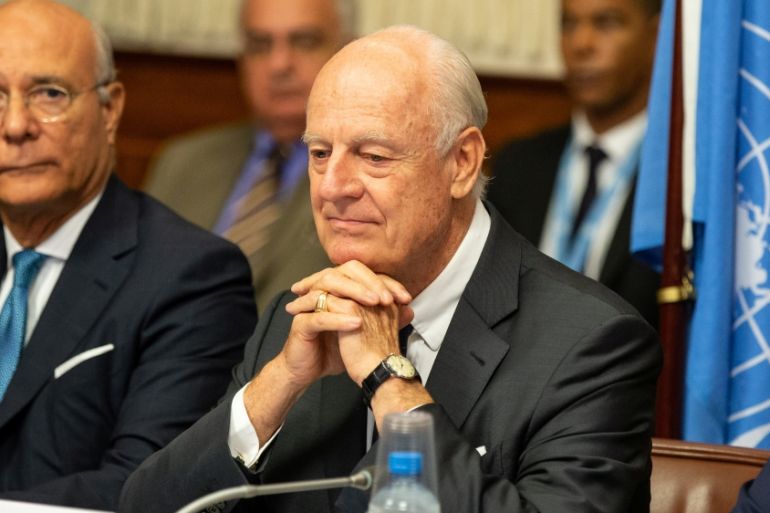Syria constitutional committee ‘will not be formed’ in 2018
UN envoy De Mistura says he regrets the outcome, admitting his efforts to establish a committee while in office failed.

The outgoing United Nations envoy to Syria, Staffan de Mistura, acknowledged that a committee tasked with writing a new constitution for the war-torn country would not be in place by year end as was hoped.
“We have nearly completed the work of putting in place a constitutional committee to draft a constitutional reform, as a contribution to the political process – but there is an extra mile to go,” De Mistura told the UN Security Council on Thursday.
Keep reading
list of 4 items‘Blatant aggression’: Reactions to US veto of Palestine’s UN membership bid
US blocks Palestinian push for full UN membership at Security Council
Why is Germany maintaining economic ties with China?
“I deeply regret what has not been achieved, and I am sorry more was not possible,” he said in his final address to the UN body before stepping down.
The UN Security Council should share in that regret too, he also said and added that “a renewed sense of common purpose and concerted action” is needed in the UN body if 2019 is to be “the real turning point” for Syria.
The committee has become the centrepiece of UN peace efforts in Syria and aims to set up elections that can turn the page on seven years of devastating war. De Mistura will hand over his job to Norwegian diplomat Geir Pedersen on January 7.
No deal
On Tuesday, Russia, Iran and Turkey, supporters of the main sides in Syria’s complex civil war, together with UN representatives, failed to agree on the makeup of the committee but called for it to convene early next year to kick off a viable peace process.
According to the UN plan, the committee would have 150 members: 50 chosen by the regime of President Bashar al-Assad, 50 by the opposition and 50 by the UN, the latter group made up of technical experts and representatives of civil society.
However, Damascus blocked the composition of the third group, and recently suggested its own “17 name changes” to the list, according to a diplomat who asked not to be named.
Although Damascus’ objection was backed by Russia, Iran and Turkey, the UN said the changes would alter the balance of the group and said it could only accept six of them.
“The United Nations, having examined the names, assessed that we would not feel comfortable yet giving the UN stamp of legitimacy to all 50 of them as meeting the necessary criteria of credibility and balance,” De Mistura said, calling some of those Syria had sought to exclude “natural bridge-builders.”
Russia and Iran, which support Assad’s regime, and Turkey, which backs the moderate opposition, have been in close cooperation through the so-called Astana talks that are aimed at finding a solution to the Syrian conflict.
Various so-called “de-escalation zones” were agreed among the three guarantor powers in Syria as a result of multiple rounds of talks between the three powers.